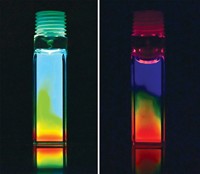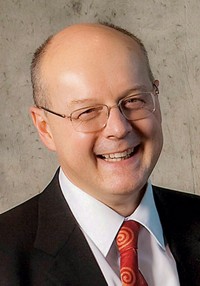Advertisement
Grab your lab coat. Let's get started
Welcome!
Welcome!
Create an account below to get 6 C&EN articles per month, receive newsletters and more - all free.
It seems this is your first time logging in online. Please enter the following information to continue.
As an ACS member you automatically get access to this site. All we need is few more details to create your reading experience.
Not you? Sign in with a different account.
Not you? Sign in with a different account.
ERROR 1
ERROR 1
ERROR 2
ERROR 2
ERROR 2
ERROR 2
ERROR 2
Password and Confirm password must match.
If you have an ACS member number, please enter it here so we can link this account to your membership. (optional)
ERROR 2
ACS values your privacy. By submitting your information, you are gaining access to C&EN and subscribing to our weekly newsletter. We use the information you provide to make your reading experience better, and we will never sell your data to third party members.
Awards
Mostafa El-Sayed Wins Priestley Medal
ACS Awards: Georgia Tech nanomaterials pioneer honored for research and ACS community service
by Mitch Jacoby
June 15, 2015
Some people just don’t know when to slow down. Eighty-two-year-old Mostafa A. El-Sayed is one of them.
For nearly 60 years, El-Sayed, who is a Regents’ Professor and the Julius Brown Chair at Georgia Institute of Technology , has conducted highly acclaimed chemistry research and served as a chemistry educator and journal editor. He is as active in science now as ever. In recognition of his decades-long contributions to chemistry, El-Sayed will receive the Priestley Medal, the American Chemical Society’s highest honor, in 2016.
“This is wonderful news, just fantastic,” an ecstatic El-Sayed told C&EN from Egypt, where he manages research groups at Cairo University and the National Research Centre of Egypt, also in Cairo.
“I am lucky to have been in the right place and with the right society,” he added, referring to his many years of service to ACS, especially as editor-in-chief of the Journal of Physical Chemistry, a position he held for 24 years.
During his extensive scientific career, El-Sayed, who is currently the director of Georgia Tech’s Laser Dynamics Laboratory, has carried out numerous lines of research. Early on he developed molecular spectroscopy techniques to elucidate the molecular mechanisms and dynamics of molecules, gas-phase clusters, solids, and photobiological systems.
More recently, El-Sayed’s research group has focused on developing nanoscale materials and using those materials in catalysis, medicine, and sensing. The work has had quite an impact on the field, garnering numerous citations.

For example, one of the group’s review papers outlining the connections between the shapes of nanocrystals and their chemical and physical properties has been cited some 5,000 times since it was published in 2005. Another paper, this one detailing the synthesis of gold nanorods with narrow size and shape distributions, has remained Chemistry of Materials’ most cited and downloaded paper for several years in a row. El-Sayed’s group led the way in explaining the exceptionally intense fluorescence signal generated by these nanorods and how to use them for cancer diagnostics and phototherapy.
In related work, the team showed that custom-made nanoparticles could be used with Raman spectroscopy to observe real-time molecular changes in single cells and to follow the dynamics of drug delivery in cancer cells and their ensuing apoptosis.
El-Sayed’s colleagues are quick to share their enthusiasm for the nanomaterials pioneer. Chemistry Nobel Laureate Ahmed H. Zewail of California Institute of Technology asserts that El-Sayed has made “significant and seminal contributions to several areas of physical and biophysical chemistry.” Pointing to El-Sayed’s recent cancer studies, Zewail adds that El-Sayed “masterfully shows his innovative and creative approach and the ability to tackle interesting and broad-ranging problems.”
ACS Chief Executive Officer and Executive Director Thomas M. Connelly Jr. concurs. “Mostafa El-Sayed is an outstanding choice” to receive ACS’s most prestigious award, Connelly says. He adds that El-Sayed’s contributions to nanoscience are “truly groundbreaking,” and it is fitting that El-Sayed be recognized for inspiring students throughout his career and for his many years of journal editing. Connelly adds that he’s looking forward to hearing El-Sayed share reflections on his career during the Priestley award address at the March 2016 ACS national meeting in San Diego.






Join the conversation
Contact the reporter
Submit a Letter to the Editor for publication
Engage with us on Twitter